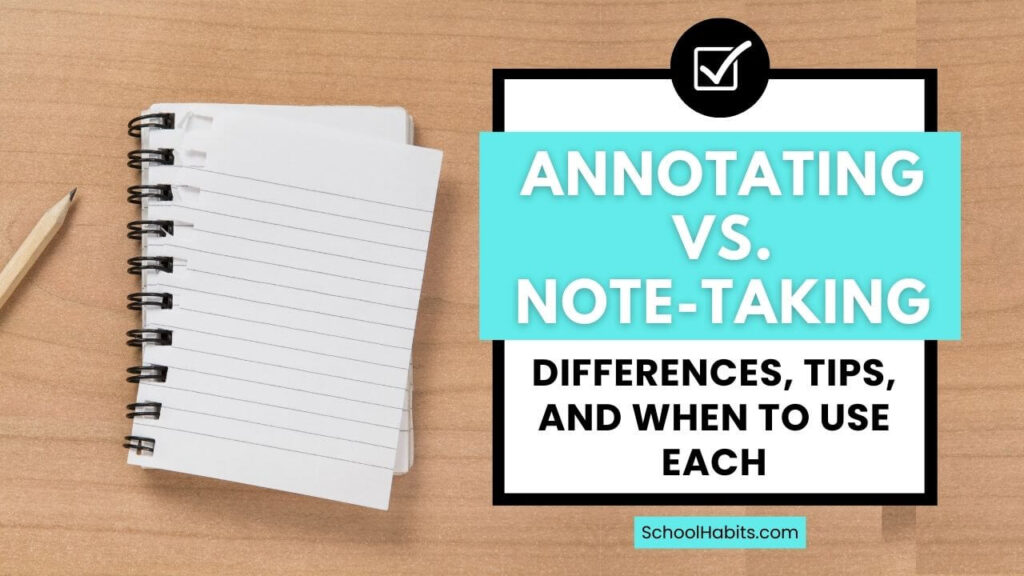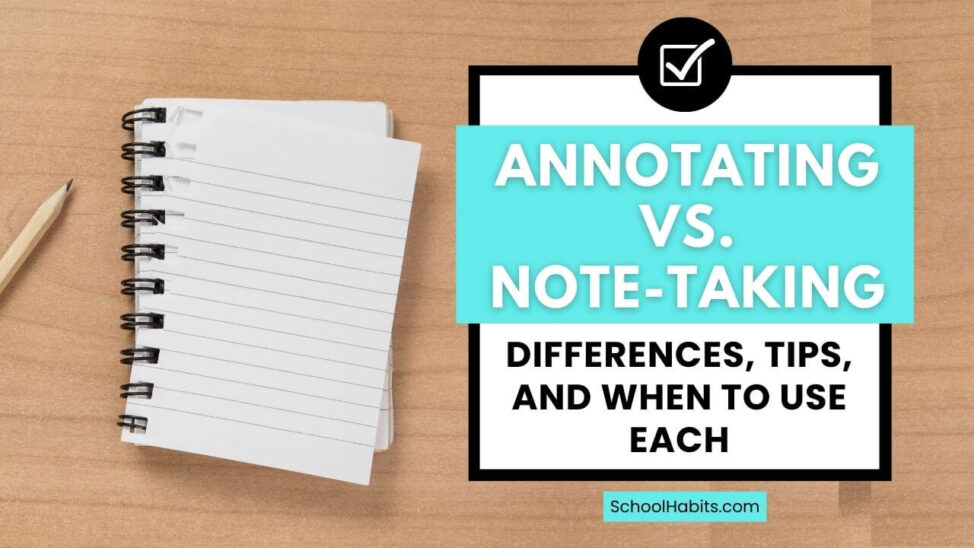By Katie Azevedo, M.Ed.
Annotating and note-taking are both school skills (and work skills!) that allow you to get more from the text you’re reading. But like with any skill, you need to know how and when to use it.
In this blog post, I dive deep into annotating vs. note-taking. I clarify exactly what they are, the similarities and differences between them, and when it makes sense to choose one method over the other.
Annotating vs. Note-Taking: What’s the Difference?
Annotating and note-taking have some similarities, so let’s start there. Then we will get into their differences.
Similarities Between Annotating and Note-Taking:
- Both are methods of indicating important ideas from the text you’re reading
- Both strategies can help you better understand what you’re reading (when we slow down to annotate or take notes, our reading comprehension improves)
- Both strategies help you retain (remember) the information you’re reading about
- What you annotate for and what you take notes on should both be directed by your purpose for reading the text
Differences Between Annotating and Note-Taking:
Annotating is when you mark up a text with highlights and written notes. You annotate directly in the text you’re reading (on the pages themselves) or on sticky notes attached to each page you annotate.
Your annotations stay on the text itself, so any time you want to revisit your annotations, you need access to the text, whether that’s a book, PDF, or article.
Note-taking is when you extract information from the text you’re reading and write it somewhere else, usually in a notebook or digital doc.
Because you’re taking notes in an external notebook, any time you want to revisit your notes you simply revisit your notebook. You do not need access to the text that you took notes on. (In other words, it’s okay to return that library book.)
Annotating vs. Note-taking: Which One to Use?
There’s a time and place to annotate, and a time and a place to take notes. (Here are the top 3 note-taking secrets of straight-A students, in case you’re curious.) Which method you use depends on the following:
- Your personal preference
- Whether or not you will have access to the text in the future
- Why you are reading the text in the first place
- What you intend to do with your notes or annotations
Using the four criteria above, let’s break down when it might be best to annotate and when it might be best to take notes.
When to Annotate Text (and Not Take Notes on It)
Annotating text is a good choice if you are going to have access to the text when you’ll be referencing your annotations in the future. If you’re annotating a text you need to return to a library, friend, or teacher, then I would suggest taking notes instead.
Annotating is also a good choice if the text is short and you have a physical copy. For example, if you’re reading a 1-10 page article that you have a physical paper copy of, you might find it easier to simply highlight and mark up the text right on the paper itself.
Annotating is a good idea if you will be reading a text and using your annotations in the same time period. In other words, if you’re assigned a reading during a class, given 20 minutes to read it, and then you need to present your thoughts to the class, it will likely be quicker and easier to mark up the text with annotations instead of extracting information to put in a notebook.
Finally, you may want to annotate instead of taking notes if your notes are only relevant when paired with a particular part of the text itself. For example, if you’re annotating a text for something specific like rhetorical language, imagery, and things of that nature, you would write your notes in the margins next to the words you’re responding to. On the other hand, if you were taking notes, you would have to rewrite the author’s words in your notebook (in addition to your notes/thoughts) so that your notes on that text would make sense to your future self.
When to Take Notes on a Text (and Not Annotate It)
There are many scenarios when it makes sense to choose note-taking over annotating. As previously mentioned, note-taking is a good choice when your access to the original text is limited, such as when you borrow a library book or a text from a teacher.
Another scenario where note-taking may be a better choice is when you only have access to a digital copy of the text you’re reading. While you can use annotation apps (like Notability), some people find scrolling back through a digital file to read digital annotations too clunky and unnatural.
Finally, the most compelling reason you might want to take notes on a text instead of annotating the text directly is if you plan to supplement your notes with additional information.
For example: Let’s say you’re reading Harper Lee’s To Kill a Mockingbird. You know you’ll be writing an essay in which you discuss the key moments of strength displayed by the character Atticus Finch. You could simply mark up the text when you encounter these moments (annotations) or you could write these moments in your notebook (taking notes) along with your ideas about what you want to say about these moments. Your future self – the one writing the essay – will thank you for choosing note-taking over annotating.
How to Annotate Text
I have published many articles, videos and podcasts about how to annotate text. Below are my most popular annotation resources:
- 11 Annotation Strategies (video)
- How to Use the Highlight and Rewrite Strategy (article and video)
- What to Highlight When Annotating Novels (article)
- 6 Common Annotation Mistakes (article)
How to Take Notes from Text
I have also published many articles, videos and podcasts about how to take notes on text. Below are my most popular note-taking resources:
- How to Take Useful Notes from Books (podcast episode)
- How to Take Useful Notes from Books (video)
- Digital Notes vs. Paper Notes (article)
- 5 Tips for Taking Digital Notes (article)
Final Thoughts About Annotating vs. Note-Taking
I encourage you to use the information you learned in this article to decide – on a case-by-case basis – whether it makes sense to annotate or take notes on your text. Weigh the pros and cons, consider how you’ll be using the information you’re extracting from the text, and then make a decision. If you make the wrong choice, learn from it and choose differently the next time around.


